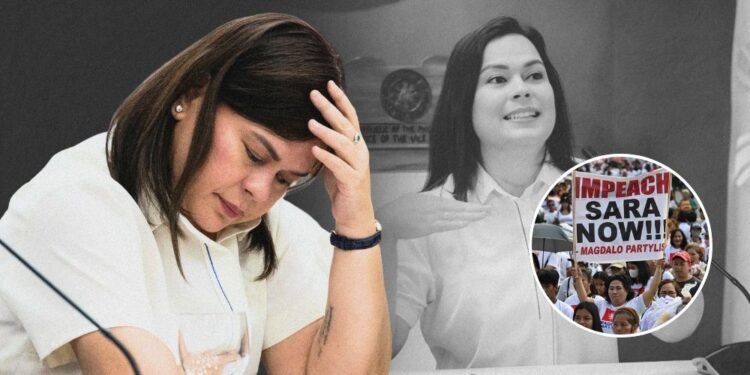More than 200 members of the House of Representatives have voted to impeach Vice President Sara Duterte, nearly double the number required by the Constitution to move the case forward.
This historic decision cements Duterte’s impeachment and sends it directly to the Senate of the Philippines for trial, where she will face the possibility of removal from office.
A Fourth and Decisive Impeachment Complaint
Sources within the House of Representatives revealed that at least 205 lawmakers have signed an entirely new impeachment complaint, separate from the previous three complaints that had been under consideration.
The President’s own son, Ilocos Norte Congressman Sandro Marcos, was reportedly the first to affix his signature, leading a coalition of House leaders who signed on during a House caucus called by the chamber’s leadership on Wednesday morning.
Among the House leaders who have reportedly signed the complaint are Reps. Aurelio Gonzales, Mannix Dalipe, Jayjay Romualdo, Jayjay Suarez, Jay Konghun, Anna Suarez, Paolo Ortega, and Dan Fernandez.
While it remains unclear whether Speaker Martin Romualdez is among the signatories, House Secretary General Reginald Velasco confirmed that the impeachment complaint has moved forward.
This latest impeachment filing is separate from the first three complaints that had been under deliberation, making it the fourth and most decisive impeachment complaint against Duterte.
It remains unclear who formally endorsed the complaint, but sources strongly suggest that Sandro Marcos played a key role in initiating the move.
The impeachment complaints accuse Duterte of misusing confidential funds, engaging in graft and corruption, and betraying public trust.
The first complaint, led by Akbayan Party-List Rep. Perci Cendaña, alleges that Duterte failed to properly account for ₱125 million in confidential funds allocated to the Office of the Vice President (OVP) in 2022.
The second, filed by Bagong Alyansang Makabayan (Bayan), also centers on betrayal of public trust, particularly regarding the misuse of confidential funds.
The third complaint, brought by a coalition of Catholic priests, civil society leaders, and lawyers, expands the accusations to include plunder, malversation, bribery, and graft and corruption.
What Happens Next: Duterte’s Fate in the Senate Trial
The filing of this fourth impeachment complaint effectively bypasses the need for hearings before the House Justice Committee and a plenary vote, meaning the case can now be immediately transmitted to the Senate for trial.
The impeachment move comes at a politically volatile time for Duterte. Just days before this development, she reaffirmed that she was seriously considering a run for the presidency in 2028, citing the Philippines’ declining competitiveness in Southeast Asia as her main motivation.
Speaking before overseas Filipino workers in Japan, she expressed frustration over the country’s state of affairs, saying there is much to be fixed and reformed to make the Philippines competitive on the global stage.
Now that the House has officially impeached Duterte, the process moves to the Senate for trial, where senators will act as judges while House members serve as prosecutors. A two-thirds majority vote in the Senate is required for Duterte’s conviction and removal from office.
If convicted, she will be immediately removed and barred from holding any future public office. If acquitted, she will remain in office. Should Duterte be removed, President Ferdinand Marcos Jr. would have the authority to appoint a new Vice President, subject to confirmation by Congress.












